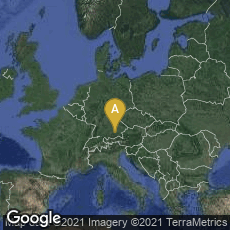

In 1925 and 1927 Adolf Hitler published Mein Kampf, the first volume of which he dictated in prison to his associate Rudolf Hess after the abortive Beer Hall Putsch in Munich, November 1923. One of the most influential books ever published, and possibly the most evil, the publication history, as well as the contents of this work, continue to be intensively reviewed by scholars, and read by people of different political persuasions, including extremists. The Wikipedia article on Mein Kampf contains unusually thorough documentation concerning its publication history.
Though publication of Mein Kampf was banned in some countries in 1947, it continued to sell widely in print in many languages, and according to a New York Times article published in November 2011, it had sold over 70 million copies by 2008. It was also freely distributed on the Internet. In 2011, with the pending expiration of its copyright, issues were raised concerning the dangers of allowing this text to circulate freely, and how it might be used to counteract prejudice and Holocaust denial, if that would be possible:
"In 1947, Austria adopted the Verbotsgesetz — or “Prohibition Act” — banning the Nazi Party and criminalizing the celebration, promotion, or adulation of Nazi ideology; in the 1990s, it was amended to prohibit Holocaust denial. (It was under this law that the English writer David Irving was jailed a few years ago for denying the existence of the gas chambers.) Distributing and displaying Nazi paraphernalia is forbidden here. Germany, Belgium, the Czech Republic, France, Lichtenstein, Luxembourg, Lithuania — all these countries also criminalize revisionism and restrict various forms of speech and publications about the Holocaust. And for nearly 70 years, the German state of Bavaria, which holds the copyright for “Mein Kampf,” has fought heartily against the book’s publication in any country where it is possible to fight it.
But now the rationale behind these restrictions is being questioned. While they may have helped limit the widespread distribution of “Mein Kampf” in Europe, repressive tactics of this kind have not aged well in the Internet era. (The book was never fully blocked anyway: in the 1980s, the U.S. Army sold it in some of its “Stars and Stripes” shops across Germany. And libraries often held copies.) Preventing a book’s publication today is largely a symbolic move.
“Mein Kampf” is widely available, in its entirety, across the Web. It has been a hit in Japan and Turkey in recent years; it has sold briskly in South America and the Middle East; and it has shown up, like a nefarious inspiration, in such ugly places as the rantings of the Norwegian mass murderer Anders Breivik. By 2008, an estimated 70,000,000 copies had been put into circulation since the book was first published in 1925, according to HatePrevention.org, a consortium of academics and activists. In other words, the restrictions on its publication may have enabled a kind of willful ignorance, a means of not recognizing the continued impact of the book’s ideas on society.
"And so as Europe faces the end of the copyright on one of the most painful texts of the 20th century, some people now believe that the best course of action is not to extend the ban, but to publish 'Mein Kampf' with extensive annotations that explain how the book was used and what it wrought — that recognize its continued presence. 'Our idea is a zero-censorship effort,' says Philippe Coen, a French attorney at the forefront of HatePrevention.org, which organized the recent conference in Paris. He, like Dreyfus, favors the pedagogical approach to the publication of Hitler’s manifesto" (http://latitude.blogs.nytimes.com/2011/11/04/the-return-of-mein-kampf/?nl=opinion&emc=tyb1, accessed 12-14-2011).